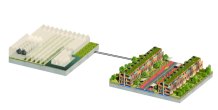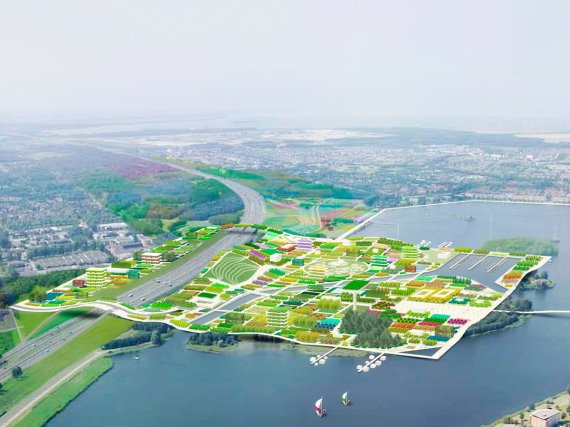The design for the Floriade grounds in Almere. Illustration: MVRDV architects
At the last World Horticulture Exhibition five years ago in Venlo, Wageningen University & Research was conspicuous for its absence. That is not going to be the case at the next Floriade in Almere. Set to steal the show at this edition is the Street of the Future, a real street with 20 to 30 houses, linked to a nearby greenhouse complex where food is produced. The whole thing will be equipped with the latest technology related to sustainable water and energy use.
This idea was the brainchild of Jan Vreeburg, of the Wageningen Environmental technology chair group. He also dubs the project Green Street or – even more poetically – his Boulevard of Accomplished Dreams. ‘It’s all about having an umbrella under which you can give shape to a systems approach,’ he explains, immediately making it sound a lot more businesslike. By ‘system’ Vreeburg means the way we treat our drinking and waste water. Our approach needs a radical overhaul, is his firm conviction. ‘What we do at present comes down to sourcing, purifying and using water, and then getting rid of it as quickly as possible. It’s all geared to throwing it away.’
This is just a start. Researchers, bring on your ideas
But the Street of the Future is geared, not to throwing away water but to reusing it. What nutrients can I extract from my waste water? The emphasis lies on phosphate. Vreeburg: ‘Phosphate is a finite resource and there is no known substitute for it. Resources of which there is still a supply now will be finished in 50 years’ time. So by then, you should have a system based on reclamation. And you have to start now, otherwise it will be too late.’
Feeding the city
Vreeburg’s future street is one of the projects currently being set up by the Amsterdam Institute for Advanced Metropolitan Solutions(AMS), a collaboration between parties including TU Delft and WUR. Not, officially, for the Floriade, but for the Flevo Campus, explains Henk Wolfert of AMS. ‘The idea is that the grounds of the Floriade will afterwards become the Flevo Campus. This plan is being worked out by Almere, the province of Flevoland, Aeres Applied Science University, and AMS.’
Almere recently welcomes its 200,000th resident. ‘And there are many more to come. The city has a big house-building allocation,’ says Wolfert. The idea behind the Flevo Campus is to provide a boost for the knowledge economy in that future city. Wolfert and Jan-Eelco Jansma, a researcher of urban-rural relations at Wageningen Plant Research, are responsible for the science programme for Flevo Campus. The theme of that programme – feeding the city – is exactly the same as the theme of the Floriade. The Floriade site is to be a testing ground for urban innovations in the field of sustainable food supply, water purification and waste flow processing.
Street level
Water purification now still takes place in large centralized purification plants. Environmental technologist Vreeburg focuses, by contrast, on the street level. ‘If you want to extract nutrients from waste flows, they have to be as small and as concentrated as possible,’ he explains. ‘A concentrated waste flow is easier to use. What is more, the smaller the flow, the smaller the installation you need for it. The street scale is suitable for that. But that is only a hypothesis. It doesn’t mean this is the perfect scale for urban services such as the water supply. That is for the project to reveal. You can’t do it at the house level, that’s for sure, because you need too much technology. The street is the smallest building block in a city.’

A sketch for the design of the Street of the Future, to go up at the Floriade. Illustration: AMS Institute
Exactly what this smallest, innovative building block is going to look like is not clear right now. Vreeburg: ‘At the moment we are making a “virtual design”. In the next few years there will be pilots in existing neighbourhoods. I have had discussions with several municipalities about that, including Wageningen. We are also going to develop new toilets and showers which use little water without complicated plumbing systems. In 2020 we are going to draw up building plans and we’ll start really building the year after that.’
Vreeburg can’t wait. ‘The Floriade is a huge opportunity. In a Street of the Future like that you can try out so many ideas. It is a powerful way of presenting innovation, to show what a decentralized system looks like.’
Other projects
There are other Wageningen researchers who are already working towards the Floriade too. A start has been made, for example on the Healing Gardens project (see text box). Other projects will follow. The central concept here is the living lab: testing in the real world whether things thought up in the lab really work.
‘The programme still has to grow,’ says Wolfert. ‘For instance we are studying the scope for using organic waste and sewer sludge from the cities to improve the fertility of the soil in Flevoland. Another project is urban development in the Almere neighbourhood of Oosterwold, where residents take care of the design themselves. This raises supervision issues which WUR is going to tackle. But this is just a start. I would say: researchers, bring on your ideas.’
Healing Garden
American research has shown that cancer patients benefit from gardening. This healing effect is the basis for a pilot which Esther Veen of the Rural Sociology chair group and colleagues at the Human Nutrition chair group want to start in the coming months in Almere. Veen will get a group of 10 to 15 cancer patients to garden at the Parkhuys, a day centre for patients and their families, for one growing season. She expects to see positive effects on their physical health (more exercise), mental health (less stress) and social health (more contacts). The pilot is the first step towards a larger study to be set up in collaboration with the Flevo hospital and other parties on the Floriade site.

